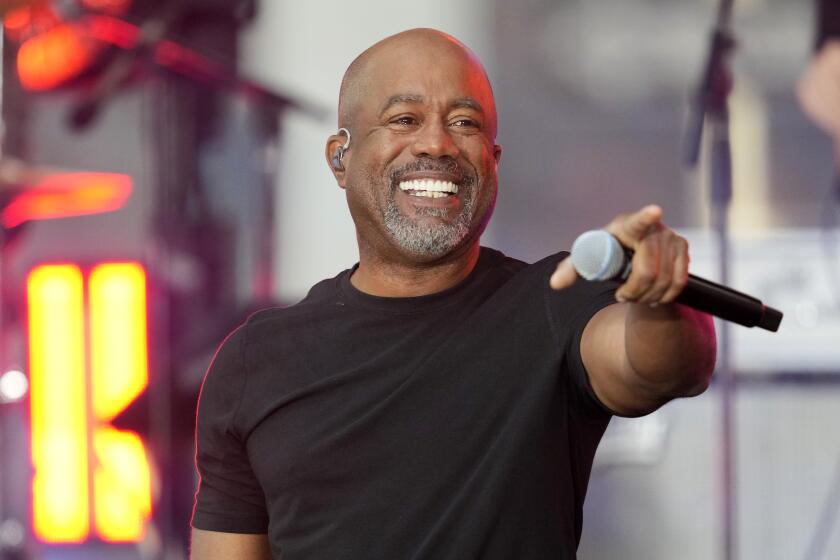Pearl Jam Throws in Towel in Crusade Against Ticketmaster : News analysis: Rock band revives two Del Mar concerts that had been canceled.
Following 14 months of one of the most bitter disputes in the live entertainment business, Pearl Jam this week threw in the towel in its crusade to stage a concert tour without the help of Ticketmaster.
Late Wednesday, the popular rock band announced that two Del Mar concerts that had been canceled would be revived on the same dates at the San Diego Sports Arena, apparently with the cooperation of Ticketmaster, which has exclusive rights to sell tickets at the venue. Ticketmaster will be paid a fee to waive their contract and that money will be donated to charity.
This startling turnaround would seem to close the book on a controversy that has inflamed rock fans and dogged both the most popular U.S. rock group and the country’s largest ticketing company for more than a year.
Or does it?
Far from settling the matter, Pearl Jam contends that its failure to mount a successful tour could present the strongest argument yet to support the band’s argument that Ticketmaster has a lock on the $1-billion concert industry and merits attention from federal antitrust investigators.
In an interview from Seattle on Wednesday, Pearl Jam manager Kelly Curtis said: “I regret to say that it is impossible for a major rock group to put on a national tour under the current circumstances without Ticketmaster. They’ve got a monopoly. We did everything we could over the past 14 months to get around them and put this tour together, but we failed. It’s up to the Justice Department now.”
Ticketmaster has frequently cited Pearl Jam’s alternative tour as proof that competition is alive and well in the concert industry. After the dispute went public, the company also offered the band a reduced service fee.
“We are pleased that Pearl Jam is doing something to benefit its fans,” a Ticketmaster spokesman said in a telephone interview from the firm’s Los Angeles headquarters, where he described the mood Wednesday as “jubilant. . . . We are happy to work with anyone that wants to use our services.”
Pearl Jam’s latest moves triggered a flurry of calls by Justice Department investigators, who have been examining antitrust allegations in the ticket industry for the past year. The probe was launched after Pearl Jam filed a memorandum accusing Ticketmaster of pressuring promoters to boycott the band’s 1994 proposal for a low-cost summer concert tour--an allegation the Los Angeles ticket giant denies.
This year, Pearl Jam sought to organize a summer tour without using Ticketmaster at all. The group, which is scheduled to kick off its tour Friday in Casper, Wyo., has encountered difficulties finding adequate venues not affiliated with Ticketmaster.
*
Sources said federal investigators sought details about the latest shake-up, possibly anticipating questions today regarding the status of the case at U.S. Atty. Gen. Janet Reno’s weekly news briefing in Washington. The Justice Department declined to comment.
Pearl Jam’s capitulation to Ticketmaster stemmed from the cancellation Monday night of the Del Mar Fairgrounds concerts, just two weeks before the band was scheduled to perform. The group decided to cancel when the San Diego County Sheriff’s Department abruptly recommended cancellation, expressing fears that thousands of fans without tickets might show up and try to crash the gates.
Curtis said there was no realistic way for the band to allay the authorities’ concerns in the next two weeks. The setback was the last straw on the costly alternative-tour venture for the band, Curtis said.
A Ticketmaster spokesman said Wednesday that the security and logistics woes that the band had blamed for its touring problems have nothing to do with Ticketmaster. Some concert industry sources privately portrayed Pearl Jam’s cancellation of the Del Mar dates as the latest in a line of publicity ploys orchestrated by the band to call attention to their dispute with Ticketmaster--a suggestion vehemently denied by the band.
Despite the Ticketmaster boycott being dropped, Curtis was unrepentant about the group’s views of the company.
“It’s been like David against Goliath since the first day we decided to take them on, but unfortunately, this time out, the giant won,” he said.
“In the end, you just have to face the fact that Ticketmaster calls the shots and give in to it. Pearl Jam is living proof that Ticketmaster can’t be beat. If the government doesn’t want to see the problem or take action at this point, I don’t know what else a rock band can do to change it.”
Southern California fans--who have waited more than a year for Pearl Jam to perform--were irate this week when they learned that the band would not play in Del Mar. Radio stations were deluged with calls from angry ticket-holders who lambasted what many perceived as the band’s temperamental behavior.
Pearl Jam has been selling tickets to its tour through a new high-tech system developed by a Costa Mesa company called ETM Entertainment Network. The industry was rampant with speculation that Pearl Jam’s actions this week would prove disastrous for the new firm, but ETM executives downplayed the significance of the events. They said it illustrated the difficulties of breaking into the ticket business.
*
“It’s a pain, but it’s nothing new,” said ETM co-founder Peter Schniedermeier. “I’ve been in this business for 26 years and have seen hundreds of cancellations. You’ll have a show fall apart here and there, but that doesn’t mean the whole tour’s in jeopardy.”
Curtis said Pearl Jam plans to play out every scheduled date on the first leg of the tour. The band has not entered into any negotiation with Ticketmaster regarding future dates but has indicated it may perform at Ticketmaster-affiliated venues in the Los Angeles area and across the nation before the end of the summer.
In recent weeks, the Justice Department has conducted another round of interviews with talent managers, promoters, venue owners and ticket software firms. Investigators served some of those individuals with “civil investigative demands”--the equivalent of a subpoena--requiring them to turn over documents considered pertinent to the case.
The results of the investigation, which are expected to be announced soon, could challenge the legality of exclusive contracts between Ticketmaster and the nation’s largest promoters and facilities. A decision to banish such agreements would significantly reduce revenues for ticketing companies and venue operators and alter the way business is conducted on the nation’s concert circuit.
*
Antitrust analysts were divided about what impact the latest development would have on the government probe.
“This is an antitrust enforcer’s dream,” said one Washington-based antitrust attorney. “Normally the government has to rely on economic theories to build a case that entry barriers into a market are high. But in this one, they’re not operating in some vague theoretical vacuum, they have a concrete example to cite.”
Antitrust attorney Don T. Klawiter disagreed. “It’s impossible to predict what the Justice Department is going to do, but it is unlikely that this one development would alter the outcome of a yearlong investigation,” said Klawiter, who works for the Washington law firm of Morgan, Lewis & Bockius. “If I had to predict, I would venture a guess that the government will not file suit in this matter.”
Times staff writer Ross Kerber contributed to this report.
* SEEKING OTHER ACTS
Alternative ticket firm optimistic about business. D6
More to Read
The biggest entertainment stories
Get our big stories about Hollywood, film, television, music, arts, culture and more right in your inbox as soon as they publish.
You may occasionally receive promotional content from the Los Angeles Times.










